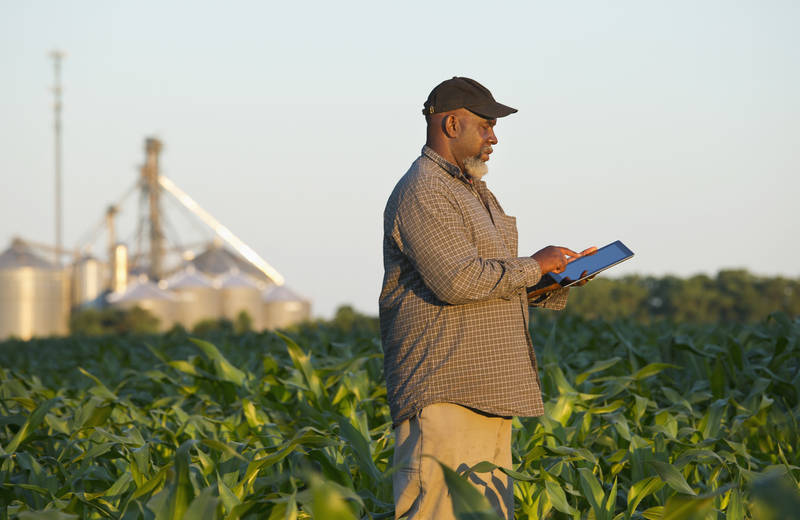
Case studies across Africa demonstrate the positive impact that access to even the most basic mobile technology can offer smallholder farmers. This underscores the importance of driving inclusive access to digital technology, especially mobile-based, to help the continent’s farmers mitigate the impact of climate change.
This assertion is championed by Vodacom, Vodafone, Safaricom, and the United Nations Capital Development Fund in their co-authored report, Towards a Connected Climate. The paper is the third in a six-part series, published as part of Africa. The connected initiative was established to help close digital divides hindering sustainable progress in Africa’s key economic sectors, like agriculture.
Using technology to enable smallholder farmers to become more resilient is a matter of urgency, as they comprise such a large part of the farming sector. It is estimated that the continent is home to 250 million smallholder farmers. However, as McKinsey notes, despite Sub-Saharan Africa is home to a quarter of the world’s arable land it only produces 10% of the world’s agricultural output.
“Sustainably increasing farming productivity is imperative, and technology has a great role to play as a developmental tool. There is anecdotal evidence of this development in the markets in which Vodacom operates within the continent where smartphone penetration is still low but small scale farmers are not outpaced,” says Takalani Netshitenzhe, External Affairs Director for Vodacom South Africa.
The Impact of Climate Change
Across Africa, climate change presents a major threat to agricultural development in the form of extreme weather conditions such as the increased intensity and frequency of droughts, extreme heat, erratic rainfall patterns, heavier storms, and flooding. Farmers in developing markets are typically more vulnerable to these changing weather patterns than farmers in developed nations.
The extreme and unpredictable weather conditions cause greater crop volatility, hamper livestock yields, and increase the likelihood of pest and disease outbreaks, which in turn, has a massive impact on the economy. Vodacom says they want to reduce its carbon emissions by 50% by 2025 to contribute to the climate change targets that governments of the markets in which we operate have made under the Paris Agreement on climate change.
“There’s no denying that the introduction of mobile-based technology must be complemented by access to low-cost devices, network coverage, and affordable data, especially for people in under-serviced and under-developed areas. To this end, government, the private sector, and civil society need to continue to collaborate on connecting underserved, rural areas ensuring that no one is left behind,” adds Netshitenzhe.
Making Technology Available to Farmers
Vodacom says they have made great strides in heeding this call to action, increasing network coverage across rural areas in its markets, and making affordable handsets available to millions of Africans to date.
“Across the continent, where Vodacom operates, examples show how simple mobile-based technology can unlock opportunities, even for farmers using entry-level feature phones, no matter where they are based,” says Netshitenzhe.
Inclusion for all also requires tailor-making products and services for each market segment and where smartphone penetration is still low, creating and making available, innovative solutions that are not data-driven to pivot the developmental agenda. For instance, URL and USSD-based platforms that enable access to financial services and farming opportunities are able to easily connect small-scale farmers to the agricultural value chain.
In Tanzania, the M-Kulima mobile platform connects smallholder farmers to a wealth of information and resources via short message service (SMS), unstructured supplementary service data (USSD), and interactive voice response (IVR). M-Kulima provides timely weather forecasts that help farmers plan around climate change and offers important market information to help farmers get the best price for their products.
M-Kulima is also integrated with the financial-services platform M-Pesa, to nurture financial inclusion by providing a mobile-phone-based money transfer service and enabling payments and micro-financing.
Meanwhile, in Kenya, the end-to-end DigiFarm platform – available via USSD or via the app – provides everything from basic farming advice to more advanced and mechanised support, much in the same way that M-Kulima does.
Encouraging Women to Join Farming
In South Africa, Vodacom partnered with UN Women and South African Women in Farming (SAWIF) to establish and drive a Women Farmers Programme aimed at making agriculture more accessible and profitable for women by teaching them how to use apps to connect to potential customers and unlock enormous economic growth.
The project has so far trained more than 2000 women and the SAWIF database of farmers is now digitised and is easily accessible by all the women who have received computer literacy and basic business management training. This programme has resulted in testimonials by the beneficiaries of how embracing technology has changed their approach to both technology adoption and farming.
Examples like these highlight how mobile technology unlocks economic opportunities for the farmers but also provides them with the confidence to use technology and assist their learner-children with homework using technology.
The Covid-19 pandemic has demonstrated that digital transformation is key to the developmental agenda and therefore information and communications technology companies need to accelerate the pace to remove barriers to access to communication focusing on both mobile and fixed broadband roll-out, affordable devices, digital literacy, and affordable data.
Towards a Connected Climate opens a conversation around challenges in the farming sector.
“By pinpointing where farmers are struggling and proposing the path forward on the back of technology, we can make impactful, sustainable changes that will promote climate-smart agriculture on the continent,” Netshitenzhe says.
Edited by Zintle Nkohla
Follow Zintle Nkohla on Twitter
Follow IT News Africa on Twitter